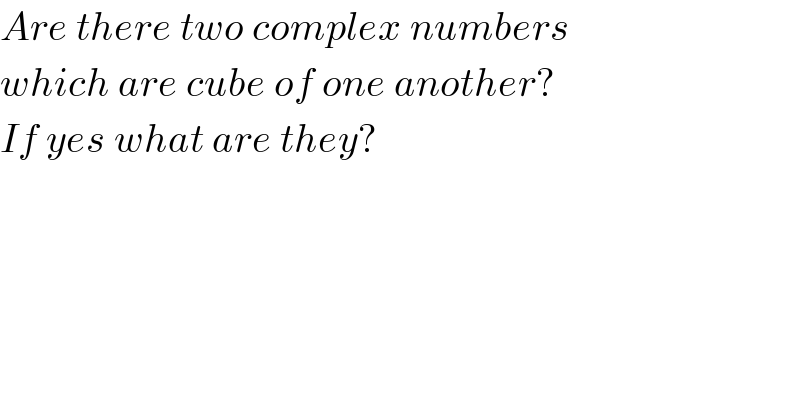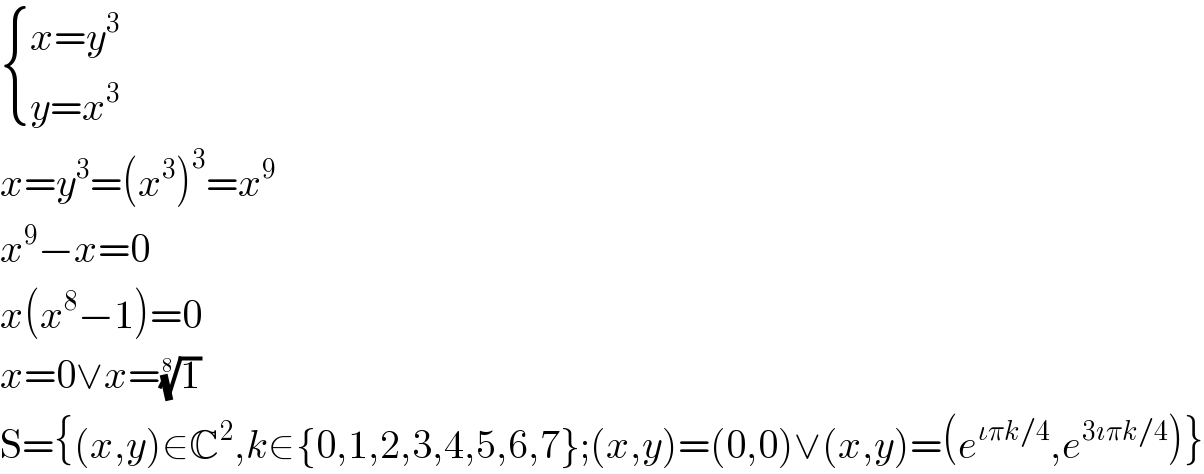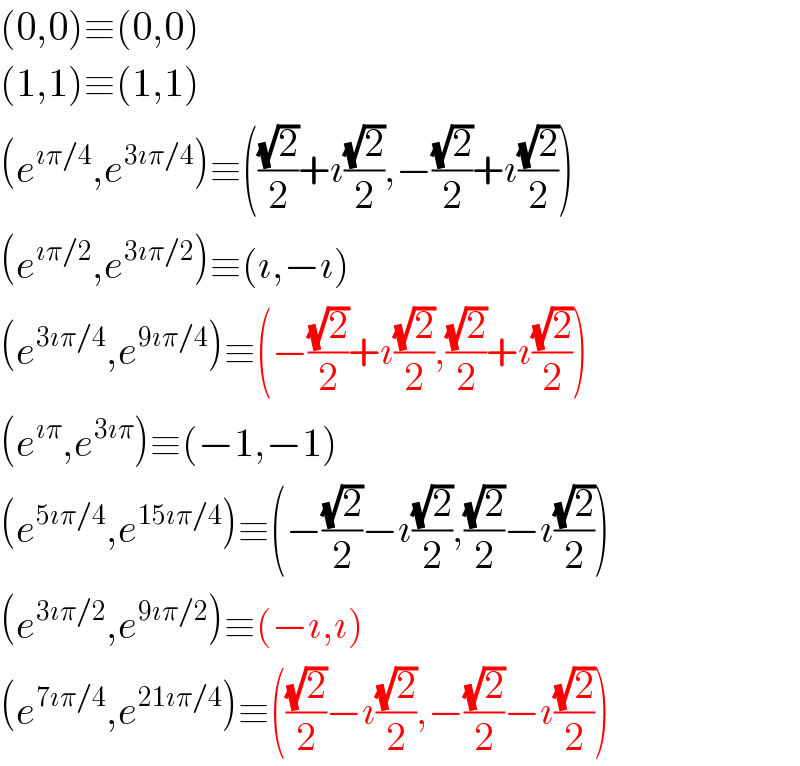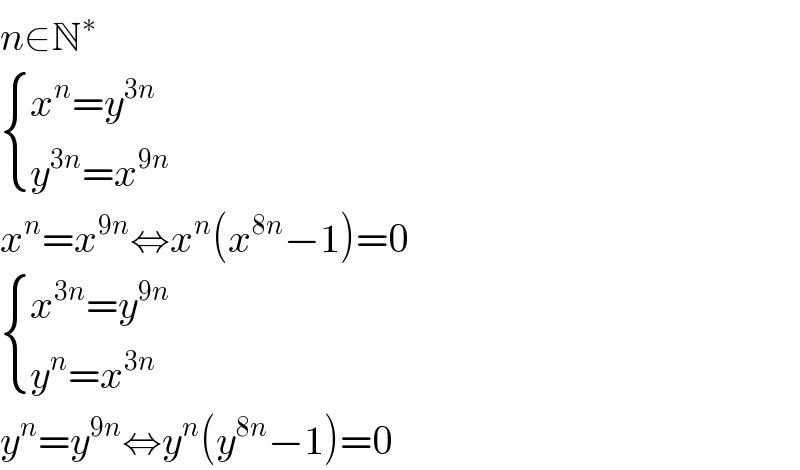
Question Number 1439 by Rasheed Ahmad last updated on 04/Aug/15

$${Are}\:{there}\:{two}\:{complex}\:{numbers} \\ $$$${which}\:{are}\:{cube}\:{of}\:{one}\:{another}? \\ $$$${If}\:{yes}\:{what}\:{are}\:{they}? \\ $$
Answered by 123456 last updated on 04/Aug/15

$$\begin{cases}{{x}={y}^{\mathrm{3}} }\\{{y}={x}^{\mathrm{3}} }\end{cases} \\ $$$${x}={y}^{\mathrm{3}} =\left({x}^{\mathrm{3}} \right)^{\mathrm{3}} ={x}^{\mathrm{9}} \\ $$$${x}^{\mathrm{9}} −{x}=\mathrm{0} \\ $$$${x}\left({x}^{\mathrm{8}} −\mathrm{1}\right)=\mathrm{0} \\ $$$${x}=\mathrm{0}\vee{x}=\sqrt[{\mathrm{8}}]{\mathrm{1}} \\ $$$$\mathrm{S}=\left\{\left({x},{y}\right)\in\mathbb{C}^{\mathrm{2}} ,{k}\in\left\{\mathrm{0},\mathrm{1},\mathrm{2},\mathrm{3},\mathrm{4},\mathrm{5},\mathrm{6},\mathrm{7}\right\};\left({x},{y}\right)=\left(\mathrm{0},\mathrm{0}\right)\vee\left({x},{y}\right)=\left({e}^{\iota\pi{k}/\mathrm{4}} ,{e}^{\mathrm{3}\imath\pi{k}/\mathrm{4}} \right)\right\} \\ $$
Commented by 123456 last updated on 04/Aug/15

$$\left(\mathrm{0},\mathrm{0}\right)\equiv\left(\mathrm{0},\mathrm{0}\right) \\ $$$$\left(\mathrm{1},\mathrm{1}\right)\equiv\left(\mathrm{1},\mathrm{1}\right)\:\:\:\:\:\:\:\:\:\:\:\:\:\:\:\:\:\:\:\:\:\:\:\:\:\:\: \\ $$$$\left({e}^{\imath\pi/\mathrm{4}} ,{e}^{\mathrm{3}\imath\pi/\mathrm{4}} \right)\equiv\left(\frac{\sqrt{\mathrm{2}}}{\mathrm{2}}+\imath\frac{\sqrt{\mathrm{2}}}{\mathrm{2}},−\frac{\sqrt{\mathrm{2}}}{\mathrm{2}}+\imath\frac{\sqrt{\mathrm{2}}}{\mathrm{2}}\right) \\ $$$$\left({e}^{\imath\pi/\mathrm{2}} ,{e}^{\mathrm{3}\imath\pi/\mathrm{2}} \right)\equiv\left(\imath,−\imath\right) \\ $$$$\left({e}^{\mathrm{3}\imath\pi/\mathrm{4}} ,{e}^{\mathrm{9}\imath\pi/\mathrm{4}} \right)\equiv\left(−\frac{\sqrt{\mathrm{2}}}{\mathrm{2}}+\imath\frac{\sqrt{\mathrm{2}}}{\mathrm{2}},\frac{\sqrt{\mathrm{2}}}{\mathrm{2}}+\imath\frac{\sqrt{\mathrm{2}}}{\mathrm{2}}\right) \\ $$$$\left({e}^{\imath\pi} ,{e}^{\mathrm{3}\imath\pi} \right)\equiv\left(−\mathrm{1},−\mathrm{1}\right) \\ $$$$\left({e}^{\mathrm{5}\imath\pi/\mathrm{4}} ,{e}^{\mathrm{15}\imath\pi/\mathrm{4}} \right)\equiv\left(−\frac{\sqrt{\mathrm{2}}}{\mathrm{2}}−\imath\frac{\sqrt{\mathrm{2}}}{\mathrm{2}},\frac{\sqrt{\mathrm{2}}}{\mathrm{2}}−\imath\frac{\sqrt{\mathrm{2}}}{\mathrm{2}}\right) \\ $$$$\left({e}^{\mathrm{3}\imath\pi/\mathrm{2}} ,{e}^{\mathrm{9}\imath\pi/\mathrm{2}} \right)\equiv\left(−\imath,\imath\right) \\ $$$$\left({e}^{\mathrm{7}\imath\pi/\mathrm{4}} ,{e}^{\mathrm{21}\imath\pi/\mathrm{4}} \right)\equiv\left(\frac{\sqrt{\mathrm{2}}}{\mathrm{2}}−\imath\frac{\sqrt{\mathrm{2}}}{\mathrm{2}},−\frac{\sqrt{\mathrm{2}}}{\mathrm{2}}−\imath\frac{\sqrt{\mathrm{2}}}{\mathrm{2}}\right) \\ $$
Commented by 123456 last updated on 15/Aug/15

$${n}\in\mathbb{N}^{\ast} \\ $$$$\begin{cases}{{x}^{{n}} ={y}^{\mathrm{3}{n}} }\\{{y}^{\mathrm{3}{n}} ={x}^{\mathrm{9}{n}} }\end{cases} \\ $$$${x}^{{n}} ={x}^{\mathrm{9}{n}} \Leftrightarrow{x}^{{n}} \left({x}^{\mathrm{8}{n}} −\mathrm{1}\right)=\mathrm{0} \\ $$$$\begin{cases}{{x}^{\mathrm{3}{n}} ={y}^{\mathrm{9}{n}} }\\{{y}^{{n}} ={x}^{\mathrm{3}{n}} }\end{cases} \\ $$$${y}^{{n}} ={y}^{\mathrm{9}{n}} \Leftrightarrow{y}^{{n}} \left({y}^{\mathrm{8}{n}} −\mathrm{1}\right)=\mathrm{0} \\ $$
